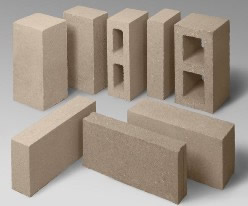Blocks
are larger than bricks. For this reason a block usually requires both hands to
lift it for laying. However, because they are larger, they can be laid more
quickly than bricks, but the bigger size also means less versatility in laying
especially when building up ends or corners and also laying to curves.
Generally
blocks are intended to be plastered.
A concrete block is one of several precast concrete products used in construction. The term precast refers to the fact that the blocks are formed and hardened before they are brought to the job site. Most concrete blocks have one or more hollow cavities, and their sides may be cast smooth or with a design. In use, concrete blocks are stacked one at a time and held together with fresh concrete mortar to form the desired length and height of the wall.
Concrete
blocks are termed either dense or lightweight. Lightweight concrete blocks can
be one-third the weight of dense blocks. Lightweight blocks have the following
advantages;
- easier to handle and quicker to lay,
- the air in lightweight block provide better
sound and thermal insulation,
- the lighter weight results in lighter
foundations and structural members, and
- they can be cut and chased with hand tools
and hold nails and screws without plugs.
Types of
concrete blocks
Solid blocks – no formed holes or slots.
Cellular blocks – with cavities (holes)
which do not pass through.
Hollow blocks – with cavities which pass
through.
Hollow Blocks
Solid Block
Strength
The minimum crushing strength of concrete
blocks are given below:
|
|
Concrete density1
kg/mm3
|
Strength
N/mm2
|
|
Dense
aggregate
|
1500-2000
|
2.8-3.5
|
|
Lightweight
aggregate
|
700-1500
|
2.8-10.5
|
|
Autoclaved
aerated
|
400-900
|
2.8-7.0
|
Thermal and sound insulation
Thermal
conductivity of blocks varies with density. Lightweight concrete blocks have
better thermal insulation compared to denser blocks.
Fire resistance
Fire
resistance of concrete blocks is good.
Durability
Durability
of facory-made blocks is generally good. Blocks made with dense aggregate and
having a compressive strength of at least 7 N/mm2 can be used for external walls and below
ground level as damp-proof courses.
Ease of construction
The speed for constructing a masonry wall using concrete blocks is faster that usual bricks-made wall. This is because the sizing of blocks is more massive then bricks.T. Furthermore, cinder and concrete blocks typically have much lower water absorption rates than brick.
Construction of masonry wall using concrete blocks
Before filling in corefill
The various types of concrete blocks that had been appeared in the market now.



.jpg)




.jpg)
.jpg)
